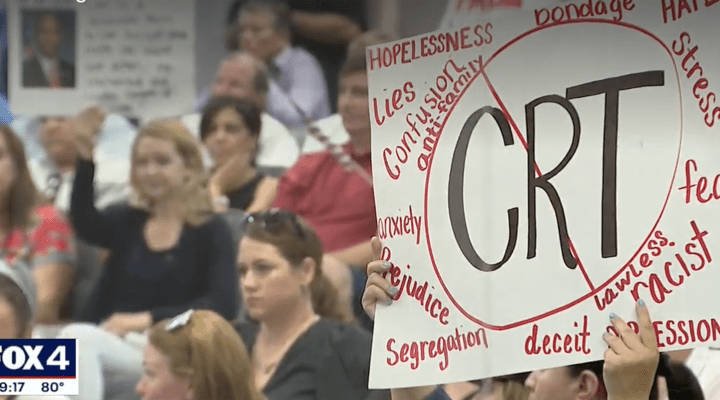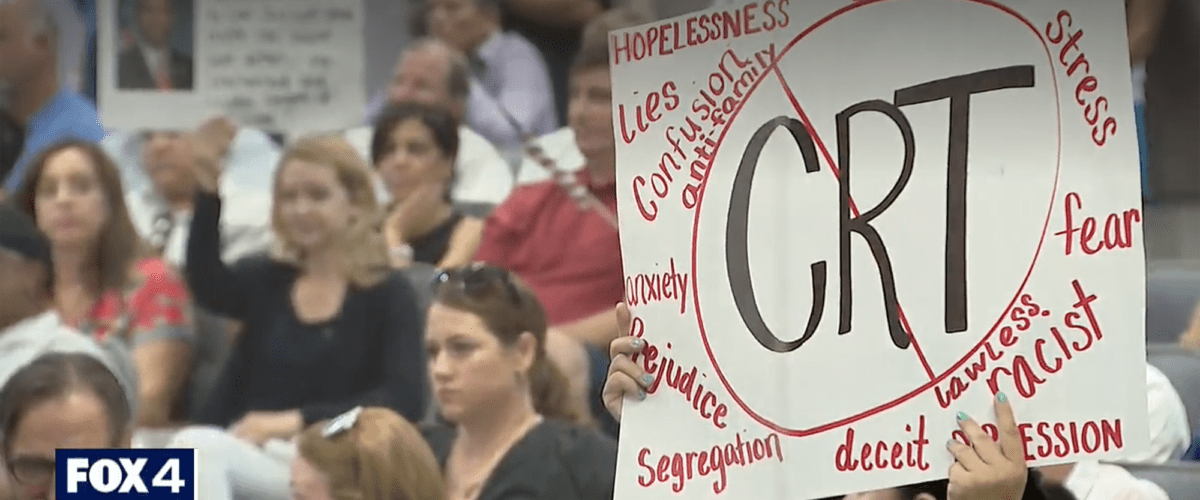School boards across America are under attack by conservative parents whose fears of woke liberalism are being stoked by national organizations affiliated with Donald Trump and the Republican Party, as well as Fox News and other conservative media outlets.
The result is chaos at school board meetings, physical violence, shouting and other behavior that would not be allowed in a classroom. In short, angry parents are behaving in ways they would not tolerate with their own children — all under the banner of protecting those children from being taught about America’s original sin of racism.
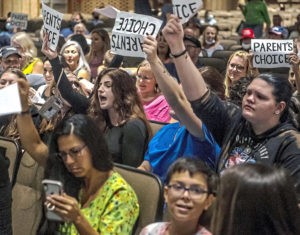
On Aug. 25, 2021, people hold signs and chant during a meeting of the North Allegheny School District school board regarding the district’s mask policy, at at North Allegheny Senior High School in McCandless, Pa. The nation’s school boards are asking President Joe Biden for federal assistance to investigate and stop a growing number of threats made against their members, on Thursday, Sept. 30. (Alexandra Wimley/Pittsburgh Post-Gazette via AP)
The catch-all label for these ills is Critical Race Theory, a law school construct for understanding systemic racism that public school administrators say is not being taught in elementary, middle or high schools. Concerned parents counter that this embodiment of liberal wokeness takes many forms and is shaping public school curricula and personnel, who may not realize they have been infected by Critical Race Theory.
One conservative group has gone so far as to suggest that public school teachers should be equipped with body cams so that parents can monitor every word their children hear and be ready to counter perceived liberal indoctrination.
This is one reason among many that some observers believe the endgame for those stoking the current parent protests is to dismantle public education — or at least cripple it further by lack of funding.
Such a tactic is nothing new for conservative Christian parents in America, who were at the forefront of starting private Christian schools in the 1960s and ’70s to counter the forced integration of public schools. The racist motivations of starting these church-based schools have been well documented.
Those documenting the current conflagration cite three sparks for its rapid deployment: Hatred for the New York Times’ 1619 Project, the racial reckoning set off by the murder of George Floyd in Minneapolis, and Trump’s defeat in the 2020 presidential election. Amid this storm of resentment — capped by loss of the White House but despite conservative control of many state governments — a few parents, egged on by national figures, have zeroed in on nonpartisan school boards as the latest perpetrators of liberalism.

Steve Bannon (Photo by Alex Wong/Getty Images)
Steve Bannon, Trump’s former White House adviser, told them so. On his podcast in May, Bannon explained: “The path to save the nation is very simple — it’s going to go through the school boards.”
Bannon later told Politico that Republicans are leveraging fears about Critical Race Theory because it could help them win elections. “This is the Tea Party to the 10th power,” he said. “This isn’t Q, this is mainstream suburban moms — and a lot of these people aren’t Trump voters.”
Same song, different location
NBC News has been at the forefront of reporting on and analyzing the current protests about Critical Race Theory. It has documented at least 165 organizations operating across the nation to coalesce parents and other concerned citizens into action. Some of those are authentically grassroots groups launched by one or two parents. But others are well-oiled and well-funded political machines — almost always with ties to Trumpism.
One example is Citizens for Renewing America, which has published a slick 34-page toolkit on how to identity and oppose Critical Race Theory in your public school system.
“This guide is meant for anyone of any knowledge and experience level who is concerned about what children are being taught and how they are being treated, with an emphasis on making the banning of Critical Race Theory the central theme by which you reclaim your schools,” the booklet’s introductions states.
 The group’s site offers resources for a range of issues common to Trumpism, including Critical Race Theory, big tech, COVID, secure borders and election integrity. Its president and executive director both have deep ties to Trump and his Congressional supporters.
The group’s site offers resources for a range of issues common to Trumpism, including Critical Race Theory, big tech, COVID, secure borders and election integrity. Its president and executive director both have deep ties to Trump and his Congressional supporters.
President Russ Vought served as director the Office of Management and Budget and was a member of Trump’s cabinet. Executive Director Wade Miller is a former Marine who served as political director for Texas Sen. Ted Cruz and as chief of staff for his “good friend,” Rep. Chip Roy of Texas.
Quoting MLK as an ally against Critical Race Theory
The booklet on how to combat Critical Race Theory in public schools begins with a full-page pull-out quote from Martin Luther King Jr.: “I have a dream that my four little children will one day live in a nation where they will not be judged by the color of their skin but by the content of their character.”
Words King famously uttered in his quest to raise acceptance of Black children to the same privileges as white children are turned back to make this white-led advocacy group’s case that white children should not be considered inferior to non-white children.
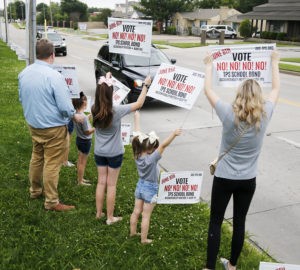
A group of protesters wave signs at traffic outside The Charles C. Manson Education Service Center in Tulsa, Okla., on Monday, June 7, 2021, as the Tulsa County Republican Party rallies against Tulsa School Board’s bond proposals. (Tanner Laws/Tulsa World via AP)
A key talking point of the anti-Critical Race Theory movement is that liberals are making white children feel inferior to other children by teaching that their ancestors were enslavers and abusers of Black people. The idea of any inherent or systemic racism is anathema to these parents.
The guide for parents addressing their school boards explains Critical Race Theory, in part, as teaching that “straight white people, children included, are inherently and irredeemably racist, and benefit from — as well as systematically rig — all the social institutions, rules, laws, and norms that white people invented and keep in place for their own disproportionate success and in order to maintain their own stranglehold on power.”
That is a distortion of what Critical Race Theory actually teaches — at the graduate-school level — which is, indeed, about the systemic influence of racism but not in a way that condemns all white people.
The guide continues its alarming description: “In other words, because people of color were discriminated against in the past, white people, including children in schools, need to be discriminated against now in order to make up for it and let African Americans catch up.”
And again, referring back to the Civil Rights Movement, the guide declares: “CRT theorists reject the civil rights movement. The civil rights movement wanted to make sure there were equal rights in America for everyone. That means equal treatment of individuals regardless of race.”
‘Prepare to be attacked’
The group that is fueling attacks — including violent attacks — on school board members and administrators and teachers warns that those who stand up against Critical Race Theory should be prepared to be attacked by the liberals.
Critical Race Theory and Critical Social Justice are “take-over ideologies,” the guidebook warns. “CRT proponents do not care how they win as long as they win. They are not trying to win an academic debate, they are attempting to socially replace you. Read that line again: they are not trying to win an academic debate, they are trying to socially replace you.
“As such, almost any action stemming from CRT activists is designed to shut you up, diminish your standing in the community, undercut your authority to speak on an issue, alienate you from whichever group you are a part of so that others ignore you, pretend like there really isn’t any problem at all, or tear down your reputation so people don’t listen to you. Anything that they can do to win they will do.”
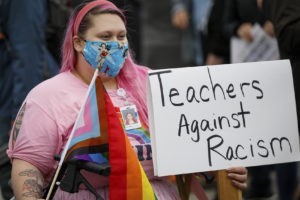
A teachers’ aide in special education holds a sign. Students, teachers, and parents rallied on Sept. 28, 2021 in Newberg, Ore., to oppose an imminent vote by the Newberg School Board that will prohibit Black Lives Matter and Pride flags or banners in their schools. The new rule, which is supported by a newly elected conservative majority of the board, is the target of a lawsuit by the Newberg Education Association. (Photo by John Rudoff/Sipa USA)(Sipa via AP Images)
But there is a way around this unjust treatment of good white people, the guidebook continues: “The good news is that these tactics can be countered, and if you counter them effectively they will backfire on CRT activists. This is not like boxing — this is like social jiu-jitsu where you use their own tactics against them to expose them.”
Tips for how to investigate your child’s school
The guidebook offers tips for parents to determine if Critical Race Theory has infiltrated their schools. If it has, “there is no time to waste: it’s time to get to work.” But even if it hasn’t, “now would be a good time to get involved in your local school board and community before radical CRT activists take it over and you have a real mess on your hands.”
Then the booklet explains where to look for telltale signs of Critical Race Theory by closely examining everything your child brings home from school, examining the materials teachers use to prepare their lessons, by scouring school websites and being on the lookout for any hint of diversity, equity and inclusion materials or offices. And then, the guide continues, “learn how to make public records requests through either the Freedom of Information Act for federal documents, or through the public information request process required by your local government entities and school boards, regarding all training, curriculum, programs, materials, school system budgets, and emails promoting CRT, whether named explicitly or not (remember sometimes they hide it by using it without calling it that.)”
Parents are advised to catalogue and document everything they find and to enlist help from friends and family if the task gets too big.
“Perhaps most importantly, find and identify sympathetic teachers, perhaps provide them a completely confidential and anonymous reporting tool, or communicate by word of mouth,” the guidebook adds. “Depending on how radicalized the school system is, their careers could be in jeopardy by speaking out, so you have a duty to help protect their anonymity if they desire to remain unnamed as a source of information.”
The guidebook then goes on to explain how to run candidates for election against sitting school board members, how to demand recall elections to remove duly elected school board members and how to work the system up to the state level once you’ve gained a foothold locally.
A school watchlist
 Citizens for Renewing America is one of several well-funded national organizations calling conservative parents to action against liberal ideology in the form of Critical Race Theory. Another prominent group is Turning Point USA, which prominently offers a School Board Watchlist on its website.
Citizens for Renewing America is one of several well-funded national organizations calling conservative parents to action against liberal ideology in the form of Critical Race Theory. Another prominent group is Turning Point USA, which prominently offers a School Board Watchlist on its website.
“The School Board Watchlist is America’s only national grassroots initiative dedicated to protecting our children by exposing radical and false ideologies endorsed by school boards and pushed in the classroom,” the site says. “SBWL finds and exposes school board leadership that supports anti-American, radical, hateful, immoral, and racist teachings in their districts, such as Critical Race Theory, the 1619 Project, sexual/gender ideology, and more. SBWL also provides information on how parents and students can get involved in their local school board and put an end to the racialization of the classroom.”
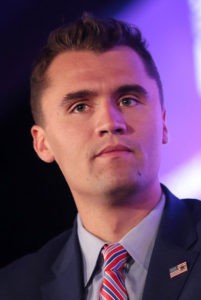
Charlie Kirk
Turning Point USA is a nonprofit organization founded by conservative commentator and Trump promoter Charlie Kirk. It bills itself as promoting “principles of freedom, free markets, and limited government” and says it believes “every young person can be enlightened to true free market values.”
In 2019, Kirk joined with Jerry Falwell Jr., who at the time was president of Liberty University, to create the Falkirk Center at Liberty, a conservative evangelical think tank. Earlier this year, after Falwell had been removed as president, the university declined to renew its contract with Kirk.
Turning Point USA lists three things it believes: “The United States of America is the greatest country in the history of the world. The U.S. Constitution is the most exceptional political document ever written. Capitalism is the most moral and proven economic system ever discovered.”
The organization’s website includes a section on Critical Race Theory that is filled with stories of oppression of white people, warnings about Marxism and other alarmist headlines. The site also includes testimonies by Black people about the dangers of Critical Race Theory.
Blacks against CRT
That is a common thread among the anti-Critical Race Theory groups — highlighting Black people who believe like good Christian white people do. Just as Citizens for Renewing America coopts Martin Luther King’s words to their cause, groups like Turning Point USA use the testimony of Black conservatives to make the case that they aren’t racist.
Donald Trump received 12% of the Black vote in the 2020 presidential election, indication that there is a small segment of the nation’s Black population that embraces Trumpism, which correlates to some Black support for the anti-Critical Race Theory movement.
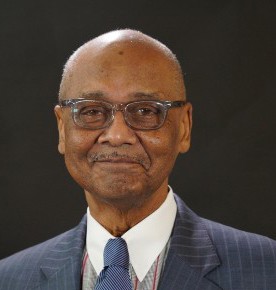
Robert Woodson
An indication of this is another group called 1776 Unites, which is predominantly led by Black “independent scholars, counselors and role models,” its website explains. It was founded by Robert Woodson, a civil rights activist who favors telling positive stories of Black success rather than negative stories about Black oppression.
In February 2020, his Woodson Center launched 1776 Unites to counter what Woodson called the “lethal” narratives of the 1619 Project. “This garbage that is coming down from the scholars and writers from 1619 is most hypocritical because they don’t live in communities (that are) suffering,” he said.
Woodson later went on Fox News to call the 1619 Project “one of the most diabolical, self-destructive ideas that I’ve ever heard” and to say the Pulitzer Prize-winning report was itself a form of “white supremacy” that denies Black Americans agency and sees them as being incapable of overcoming adverse circumstances.
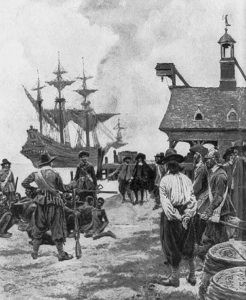
An engraving depicting the arrival of enslaved Africans at Jamestown, Va., in 1619. (Wikimedia Commons)
To counter this, 1776 Unites draws its name not from the year the first enslaved Black persons arrived in colonial Virginia (1619) but the year of the colonies’ Declaration of Independence from England. The Woodson project offers a high-school-level curriculum that tells “authentic, inspiring stories from American history that show what is best in our national character and what our freedom makes possible even in the most difficult circumstances.”
The group’s website says these stories “celebrate Black excellence, reject victimhood culture, and showcase African Americans who have prospered by embracing America’s founding ideals.”
Even though Black persons in early America were enslaved, their ancestors benefit today from a nation built upon “a set of virtues and values that would create a truly free society, the freest the world had ever seen. They even knew at the time it was falling short of truly delivering on that promise for all, but they knew what they were working toward.”
Thus, 1776 Unites declares that it is “essential that children learn they are agents of their own uplift, knowing their possibilities, responsibilities, and what it means to be an American.”
Another 1776 approach
Woodson’s kinder, gentler adoption of 1776 as a counter to 1619 is not shared by another organization battling the 1619 Project and Critical Race Theory. The first thing to greet visitors to the website of the 1776 Project PAC is a pop-up box to “report” school districts promoting Critical Race Theory.
This group bills itself as “promoting patriotism and pride in American history” as a political action committee “dedicated to electing school board members nationwide who want to reform our public education system by promoting patriotism and pride in American history. We are committed to abolishing Critical Race Theory and The 1619 Project from the public school curriculum.”

Jennifer Feucht, right, candidate for Olentangy Local Board of Education, delivers campaign flyers and yard signs to Brad, left, and Tina Krider Oct. 7, 2021, in Westerville, Ohio. Across Ohio and the nation, parental protests over social issues like mask mandates, gender-neutral bathrooms, teachings on racial history, sexuality and mental and emotional health are being leveraged into school board takeover campaigns. (AP Photo/Jay LaPrete)
It describes Critical Race Theory as “a radical belief that pushes the idea that America is an inherently racist country and white Americans are stained with the original sin of racism for which they can never be cleansed. Their solution is to remake the U.S., abandoning our founding documents and the capitalist system.”
It adds: “The 1776 Project PAC is pushing back against this growing crisis in our public education system by campaigning on behalf of school board candidates that vow to overturn any teaching of the 1619 Project or Critical Race Theory in their school districts. We will also support any type of education reform that promotes a patriotic vision of America and its history.”
What happens when a person reports a school they believe is promoting Critical Race Theory is not clear, as there is no list of questionable schools published on the site, just as there is no leadership or board or any other identifying information on the site. The only other way to interact with the group is to donate money.
Another agenda
Tyler Kingkade is an investigative report for NBC News who has researched the current wave of school board protests in detail. In June, he appeared on the NPR show “Fresh Air” with Terry Gross, who asked him if those who are stirring the pot have other agendas.

Tyler Kingkade
“Yeah, there are absolutely larger goals at play,” Kingkade replied. “I think there are a lot of people in conservative activist circles and in Republican circles who see this as their chance at another Tea Party-like wave. There has just been a transfer of power at the national level. There’s a lot of people who feel frustrated that their side lost, and they’re looking for a place to channel that. And at the same time, this is really something that, I think, gives folks who get engaged with this a little ownership in it. This is their school board, their school district. They feel like they are the ones to make a difference.”
David Barber, professor of history at the University of Tennessee at Martin, sees another agenda at work. Writing in the Nashville Tennessean, Barber lamented his state’s new anti-Critical Race Theory law.
“In Tennessee, our new law first makes it illegal for any public K-12 school to teach that one race is inherently superior to another; that people are inherently privileged or racist, etc., because of their race or sex; or that people’s moral character is determined by race or sex,” he explained. “While we should be glad that Tennessee is finally outlawing the teaching of racial superiority in any form, our legislature should have passed this part of its legislation 60 years ago, when it would have counted for something.”
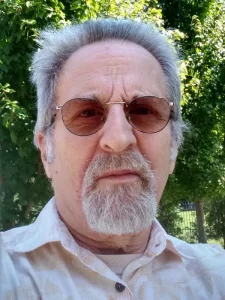
David Barber
The history professor explained: “Right up into the 1960s, public schools in Tennessee were segregated. Whites in Tennessee openly and proudly characterized themselves as superior, even as they characterized Black people as lacking in morality, as being lazy, irresponsible, criminal, over-sexed, and as being intellectually inferior.
“But now, long after slavery and segregation’s overt white supremacy has been closeted, only now does our legislature decide that it must condemn the teaching of racial superiority. Of course, this legislation’s real intent is not to prevent our public schools from ‘teaching’ the superiority of one race over another, since no one is doing that. No, the real object here is to prevent educators from discussing nearly four centuries of white domination over Black people.”
Tennessee is one of eight states (Idaho, Oklahoma, Tennessee, Texas, Iowa, New Hampshire, Arizona, South Carolina) to pass laws prohibiting the teaching of Critical Race Theory, although what that means is vaguely defined.
Barber assailed this in his Tennessean column, noting that the legislature tried to cover up their true intent by claiming the new law doesn’t prohibit the “impartial discussion of controversial aspects of history.”
He asked: “Impartial? Meaning we hear both sides? The side of the slaves and the side of their loving masters? Or the side of the 5,000 and more lynched African Americans and the side of the noble defenders of white women’s purity?”
What about the Holocaust?
Since the anti-Critical Race Theory bills passed in various state legislatures are essentially the same — they were promoted as “model” legislation by advocacy groups — Tennessee’s problem also is Texas’ problem. And it is there, in the affluent Dallas suburb of Southlake that the limits of the partisan legislation recently got tested.
On Oct. 8, an administrator with the Carroll Independent School District in Southlake advised teachers that to follow Texas’ new anti-Critical Race Theory law requires them to present opposing views on controversial subjects.
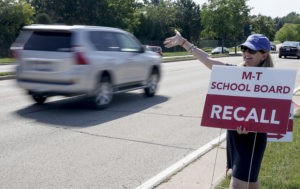
Maureen Hall, a supporter of recalling the entire Mequon-Thiensville School District board, waves at drivers outside Homestead High School Monday, Aug. 23, 2021, in Mequon, Wis. A loose network of conservative groups with ties to major Republican donors and party-aligned think tanks is quietly lending firepower to local activists engaged in the culture war fights in schools across the country. (AP Photo/Morry Gash)
This conversation happened because the conservative school board had just reprimanded a fourth grade teacher who had an anti-racism book in her classroom. As a result, teachers were concerned about what books they could keep in their own classrooms.
“Just try to remember the concepts of (House Bill) 3979,” the administrator explained. “And make sure that if you have a book on the Holocaust, that you have one that has an opposing, that has other perspectives.”
One teacher responded: “How do you oppose the Holocaust?”
A recording of the exchange was reviewed by NBC News, which reported on the encounter, creating a wave of national headlines — and outrage.
Superintendent Lane Ledbetter had to issue an apology, explaining that the district understands “there are not two sides of the Holocaust.”
Part of the debate in Texas and Tennessee and elsewhere, then, is about what constitutes historical facts. If the Holocaust is historical fact, must the lynching of Black persons in the American South also qualify as historical fact? Is not the Tulsa Race Riot a historical fact? Is not the murder of Emmitt Till a historical fact?
“As we continue to work through implementation of HB3979, we also understand this bill does not require an opposing viewpoint on historical facts,” the superintendent wrote to parents. “As a district we will work to add clarity to our expectations for teachers and once again apologize for any hurt or confusion this has caused.”
Republican state Sen. Kelly Hancock, who represents an adjacent district, wrote on Twitter that “Southlake just got it wrong.” He added: “School administrators should know the difference between factual historical events and fiction.”
Back in Tennessee, Barber wrote that situations like these are exactly why public school teachers find themselves at risk of violating the new law.
“A teacher dedicated to getting out the truth of this country’s history wouldn’t be safe,” he said. “The law also enjoins educators from offering lessons in which an ‘individual should feel discomfort, guilt, anguish or another form of psychological distress solely because of the individual’s race or sex.’
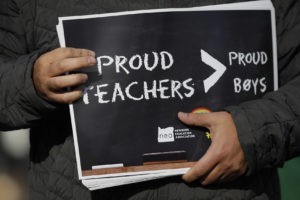
Students, teachers and parents rallied on Sept. 28, 2021, in Newberg, Ore., to oppose an imminent vote by the Newberg School Board that will prohibit Black Lives Matter and Pride flags or banners in their schools. (Photo by John Rudoff/Sipa USA)(Sipa via AP Images)
“Simply telling the truth of what happened — for example, the lynch mob’s merciless nature, slow roasting its victims, gouging out eyeballs with hot pokers, cutting off the victim’s penis and testicles, slicing open pregnant women’s wombs — simply telling that truth should cause a certain amount of distress, should it not?”
Likewise, the professor said, “You cannot teach Black history — the history of this country from the perspective of Black people — without calling into question everything we know about ourselves and about our nation.”
Follow the money
Elvia Díaz is an editorial columnist for the Arizona Republic, in another state strained by anti-Critical Race Theory fervor. Arizona, like Tennessee and Texas, this year passed legislation to outlaw a full discussion of race and racism. And school board meetings there have been overrun by angry parents defending the innocence of their children.
She wrote an editorial July 7 titled “Republicans Want to Defund Public Schools One Child at a Time Over Critical Race Theory.”
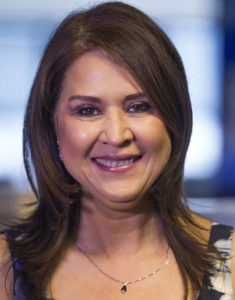
Elvia Diaz
Díaz looks beyond the current controversy to see what she believes is the long game being played by social conservatives: “They have another subplot going that could be equally or more devastating to public schools and particularly to minority students who already are largely segregated in their neighborhood districts. Conservatives call their subplot academic transparency.”
Ultimately, this movement encourages parents to take their kids out of public schools they believe teach Critical Race Theory “and take taxpayer supported education funding elsewhere,” Díaz wrote. “This matters because a good chunk of K-12 school funding is distributed to districts based on the number of children enrolled.”
She quotes Matt Beienburg, director of education policy at the conservative Goldwater Institute, who has said that state laws banning Critical Race Theory “and other racially and politically divisive material” are only a partial bandage. True transparency — remember the body cam idea — would allow parents to make more informed decisions about whether to send their kids to public schools.
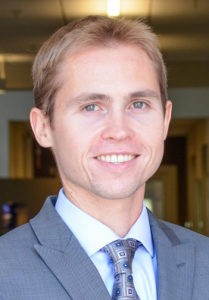
Matt Beienburg
If schools are under this kind of intense spotlight, the kind advocated by Citizens for Renewing America and Turning Point USA, they would count the cost of their “political activism,” he believes and would have to decide if it’s “worth alienating potential enrollees.”
Díaz calls this a “coordinated attack to defund public schools.”
“Targeting parents and encouraging them to boycott public schools is a brilliant political strategy for conservatives who want to keep teaching kids that America is a flawless nation and that anyone who disagrees with that assessment hates this country,” she wrote. “And they might just succeed. Don’t forget that Republicans have a proven track record at systematically defunding public schools and diverting tax dollars via vouchers to private institutions.”
Meanwhile, the battle rages
In the meantime, it is school board members, superintendents, principals and teachers who bear the brunt of the crusade against teaching the history of American racism.
In his interview on “Fresh Air,” NBC reporter Kingkade said because most of these school board battles are taking place in small towns and suburbs, the social fabric is being torn among people who have known each other outside of conflict.
“This is not happening generally in the center of large cities,” he said. “It’s happening in places where everyone knows everyone. And so it gets very personal very quickly. We talked to folks in one town in Cumberland, Maine, where one of the lead activists against Critical Race Theory has put up photos of school board members on his front lawn, billboard-sized photos, and then allegedly booby trapped them so that no one would take it down and displayed Christmas lights over them. We’ve seen in Loudoun County, Va., they just announced that they’re going to be driving around a mobile billboard on one of those small trucks with a school board member’s face on it as part of their efforts to get that school board member recalled.”
School boards in Nevada and Arizona have moved to virtual meetings not because of COVID this time but because of security concerns. “They’ve added extra security guards and metal detectors in school board meetings that have never had those before. It’s really frightening some of the people.”
Related articles:
That time I went to the school board meeting to speak against banning books | Opinion by Mark Wingfield
From Texas to Tennessee, evangelical parents are trying to take the ‘public’ out of public education | Opinion by Mark Wingfield
Organized foes of Critical Race Theory shouldn’t set the direction of our school district | Opinion by Ryon Price
Racism and the evolution of Protestant support for private education | Analysis by Andrew Gardner

